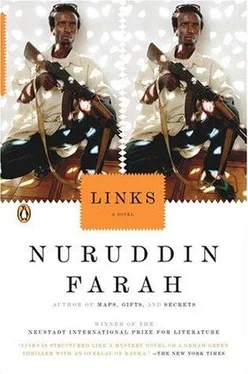She had her job and made a sufficient income, but Caloosha was too great a challenge for her to raise as a single mother. So she contracted a second marriage, as she believed that the boy needed the sobering hand of a male to bring his wild, satanic cruelties under control. Within a month of the wedding, there was considerable change in Caloosha’s behavior. He was much more restrained in his dealings with the house help, and was calmer, less prone to violence. Hagarr attributed this to her husband’s calming influence. But then she discovered bruises on the boy’s body. Once his eyes were swollen shut for days, his nose bled, and his wrists and back were sore. It turned out that her husband was in the habit of tying Caloosha’s feet together and hanging him upside down. Hagarr came home from work one day and found her son hanging there. She didn’t know what to do, short of threatening her husband to move out. The trouble was, she was close to having their first child, her second. And even though he had been beaten to the point of death, Caloosha seemed to have made peace with his own and his stepfather’s violent natures. He never complained. He took the beatings “as a man.”
Caloosha was nine and in the second grade at school when he had a particularly unpleasant altercation with his stepfather. A few days later, his stepfather was found dead, a poisoned arrow stuck in his throat. Hagarr was away on night duty. According to the two sisters of the dead man, who’d shared a room with the boy, there were no untoward noises during the night. Only the following morning, when the maid knocked on their door, did they learn of their brother’s death. He was buried the same day. There was suspicion that Caloosha had shot the poisoned arrow, but there was no proof. The boy showed no outward signs of guilt.
Hagarr went to her grave believing that her son had killed her second husband. And Bile would insist, at least in public, that he bore his half brother no grudges for seeing to an early grave the man who had fathered him.
JEEBLEH AND BILE SAT WITH THE COFFEE TABLE BETWEEN THEM. JEEBLEH was studying the photographs in an album: Raasta in her mother’s arms, in her father’s, the pictures showing clearly how engaged she had been since birth. The gaze of the one-week-old followed the movements of the photographer.
Now he wanted to know what Bile’s first thoughts were when he joined Shanta and Faahiye.
“I feel embarrassed when I look back,” Bile told him. “Regrettably, I haven’t shared my shame with a living soul. It grieves me to remember what I did.”
A hush, as quiet as early-evening shadows, descended on Bile’s face. He tilted his head slightly toward Jeebleh, in the posture of a pet being stroked.
“Why is that?” Jeebleh asked.
“I wanted to touch,” Bile said.
“Just to make physical contact?” Jeebleh recollected the urge to make contact when his solitary confinement came to its abrupt end. “I remember that feeling.”
“I wanted to be touched,” Bile said, “to be held in a human embrace. The desire to touch and be touched was so great that I nearly smothered everyone I met with a hug. I’d have been one of the happiest men on earth, if someone had touched me and I had touched them, innocuously, but lovingly too.”
“How did you satisfy the urge?”
“When I look back on those days, I recall being alive, free — but alas, I lived in a house that wasn’t my house, with a sister I hardly knew, whose husband I didn’t get on with, and I had plenty of money that wasn’t mine. The first few days, I thought about my mother, who wasn’t a physical person, maybe because, as a midwife, she looked on the human body as a shoemaker looks on leather — not intimately. Shanta was a touch-touch person and, when she was young, would cuddle up to you. Caloosha was so cruel he didn’t ‘touch’ you — you know that yourself — he hurt you. Often I remembered with pleasure the women I had loved, especially the women who had touched me where I liked to be touched, and whom I touched where they liked me to touch. I was in a needy, touch-me-please mood when I met Dajaal, soon after I gained my freedom.”
“And he dropped you off at Shanta and Faahiye’s?”
“That’s right. As it happened, I walked in through the front gate and heard a moan, which had some urgency to it. Dajaal had alerted me to Shanta’s condition as soon as I introduced myself to him. I suppose the groan I heard helped make the urge to touch less important, for a while at least. And before long, I was washing my hands and rolling up my sleeves, ready to get down to work.
“I wish I had seriously considered the ethical implications of a brother delivering his younger sister’s baby, but there was no time — the lives of the mother and the baby weighed heavily in favor of an intervention, mine. These were abnormal times. There were no hospitals functioning, and I had no way of finding another doctor to help my sister. So I did what I had to, and got down to work right away, conscious of the conditions I was working in, which were far from ideal.”
“And where was Faahiye all the while?”
“He was there, all right.”
“Doing what?”
“I seem to remember that he was as nervous as an adolescent,” Bile said. Raasta was their first baby, the first for both. His anxiety grew, and he kept knocking at the door, coming in and going out, and putting sophomoric questions to me.
“I had no idea he would want to hold his baby as soon as she opened her lungs with the welcome of life. Not many Somali men would want to hold a baby soon after birth. For me, however, everything was unreal, and I took delight in touching, hugging, being touched and hugged, because I didn’t remember what I had just done — helped at the delivery of my sister’s baby, which by medical standards in our country is unethical. We quarreled over who would hold her longer.
“I hadn’t the calmness of mind to comprehend why Faahiye was fussing, or sulking, and why he was walking out of the room. Whenever I didn’t hold her, I regretted my error of judgment, regretted that I was hogging my niece’s company, and regretted that I didn’t take into account the fact that Faahiye was as eager to hold and touch the baby as I was. Only it was too late. We were two men of advanced age, one a father, the other a maternal uncle, and we were ready to fight over a baby, just born! But never in her presence.”
“And then?”
“My sister was dead to the world for much of the first day, and when she came to and held the baby, she spoke of how she had fallen under a quiet spell. We sensed calm within ourselves whenever we were close to Raasta, and if we had to fight or argue, we would go out of the room where she was. She mattered to us all, because she guaranteed our safety. She was a child born to peace, she was an alternative to attrition. She was a protected person, so anyone physically close to her would be protected too. That’s what we believed.”
Jeebleh asked, “What became of the duffel bag?”
“I had clean forgotten about it,” Bile said. “Faahiye found it in the house and confronted me, asked where I had gotten the cash. We argued, and he accused me of robbery and murder. I was at peace with myself, and my conscience was at peace with the truth, as I knew it, and I knew I was no murderer or robber. But I had a problem explaining, and felt affronted by Faahiye. I was hurt. We got off to a bad start. That was what it was. And then there was Shanta’s sickness.”
“What was the matter with her?”
“She had an acute inflammation, which worsened soon after she started breast-feeding. This led to abscesses. Within a day, her breasts were swollen, and because there was increased hardness toward their lower edges, I decided the baby should be bottle-fed. But then Faahiye forbade his daughter to be fed on powdered milk bought with looted money. Shanta told us that as a woman she didn’t want to become a victim of what she said were ‘men’s endless petty quarrels over matters she considered to be of no importance.’ To her, what mattered was that the baby had milk, not where the milk came from, or in what form. Faahiye sulked. It was all pretty horrid.”
Читать дальше












